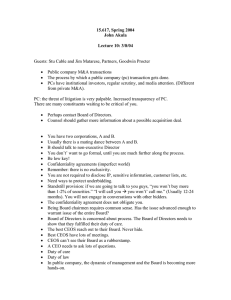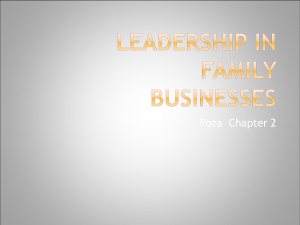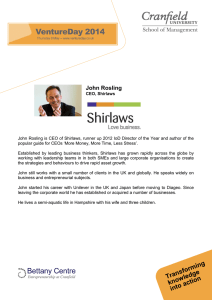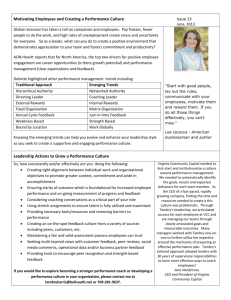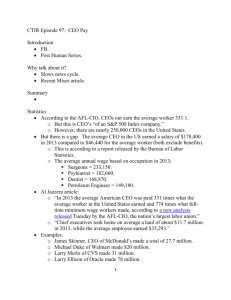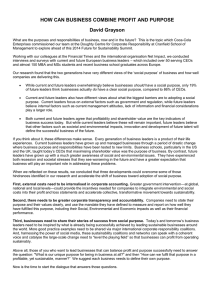2 0 1 3 E X E C...
advertisement
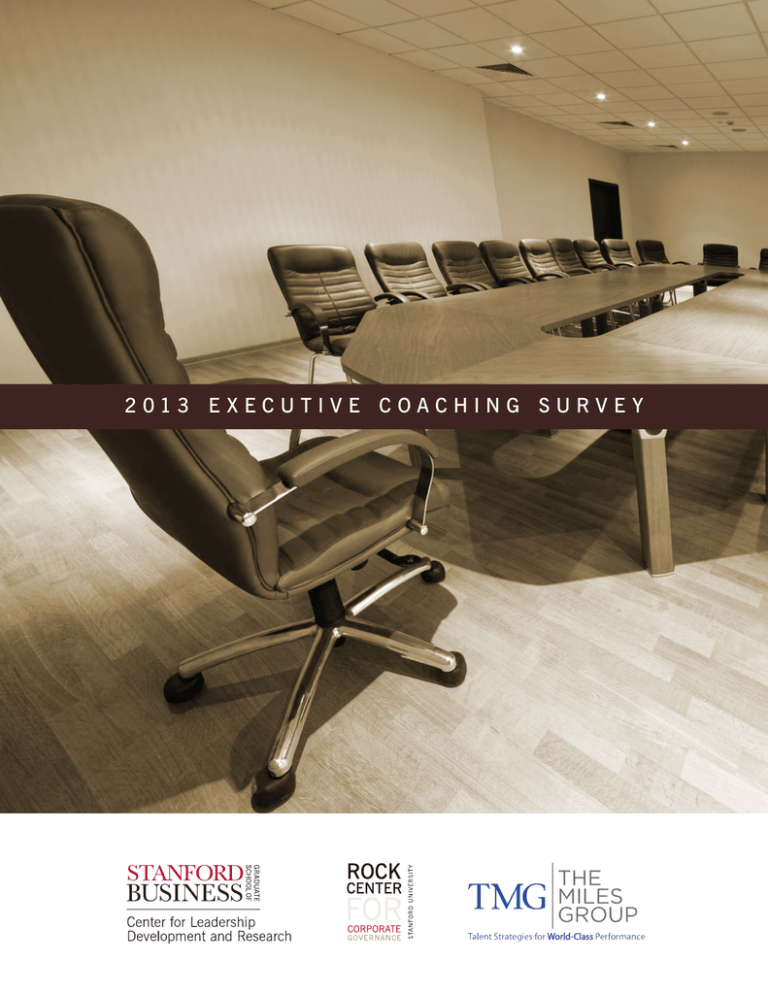
2013 E XECUTIVE COACHING SURVE Y TA B L E O F C O N T E N T S Executive Summary: Key Findings Survey Questions 2 Respondent Profile 7 About the Authors 9 About the Sponsors 10 Contact Information 11 1 2013 Executive Coaching Survey 1 Executive Summary: Key Findings Nearly Two-Thirds of CEOs Do Not Receive Outside Leadership Advice – But Nearly All Want It “Lonely at the top” resonates for most CEOs Nearly two-thirds of CEOs do not receive coaching or leadership advice from outside consultants or coaches, and almost half of senior executives are not receiving any either. “What’s interesting is that nearly 100% of CEOs in the survey responded that they actually enjoy the process of receiving coaching and leadership advice, so there is real opportunity for companies to fill in that gap,” says David F. Larcker, James Irvin Miller Professor of Accounting and Morgan Stanley director of the Center for Leadership Development and Research at the Stanford Graduate School of Business, who led the research team. “Given how vitally important it is for the CEO to be getting the best possible counsel, independent of their board, in order to maintain the health of the corporation, it’s concerning that so many of them are ‘going it alone,’” says Stephen Miles, CEO of The Miles Group. “Even the best-of-the-best CEOs have their blind spots and can dramatically improve their performance with an outside perspective weighing in.” More than 200 CEOs, board directors, and senior executives of North American public and private companies were polled in the 2013 Executive Coaching Survey. The research studied what kind of leadership advice CEOs and their top executives are — and aren’t — receiving, and the skills that are being targeted for improvement. Key findings from the survey include: • Shortage of advice at the top – Nearly 66% of CEOs do not receive coaching or leadership advice from outside consultants or coaches, while 100% of them stated that they are receptive to making changes based on feedback. Nearly 80% of directors said that their CEO is receptive to coaching. “If CEOs are willing to be coached and make changes based on coaching, it stands to reason that companies and boards should make this happen,” says Professor Larcker. • CEOs are the ones looking to be coached – When asked “Whose decision was it for you to receive coaching?” 78% of CEOs said it was their own idea. Twenty-one percent said that coaching was the board chairman’s idea. Mr. Miles sees this as a positive trend: “Becoming CEO doesn’t mean that you suddenly have all the answers, and these top executives realize that there is room for growth for everyone. We are moving away from coaching being perceived as ‘remedial’ to where it should be something that improves performance, similar to how elite athletes use a coach.” • Coaching “progress” is largely kept private – More than 60% of CEOs responded that the progress they are making in their coaching sessions is kept between themselves and their coach; only a third said that this information is shared with the board of directors. “But as coaching is starting to lose its ‘stigma,’ more of this secrecy is being removed,” says Mr. Miles. “Although much of the coaching discussion should be treated confidentially,” Professor Larcker adds, “keeping the board informed of progress can improve CEO/board relations.” • How to handle conflict ranks as highest area of concern for CEOs – When asked which is the biggest area for their own personal development, nearly 43% of CEOs rated “conflict management skills” the highest. “How to manage effectively through conflict is clearly one of the top priorities for CEOs, as they are juggling multiple constituencies every day,” says Mr. Miles. “When you are in the CEO role, most things that come to your desk only get there because there is a difficult decision to be made – which often has some level of conflict associated with it. ‘Stakeholder overload’ is a real burden for today’s CEO, who must deftly learn how to negotiate often conflicting agendas.” • Boards eager for CEOs to improve talent development – The top two areas board directors say their CEOs need to work on are “mentoring skills/developing internal talent” and “sharing leadership/delegation skills.” “The high ranking of these areas among board respondents shows a real recognition of the importance of the talent bench,” says Professor Larcker. “Boards are placing a keener focus on succession planning and development, and are challenging their CEOs to keep this front and center. However, there is still a long way to go in the area of succession for most companies, especially as you get further down the reporting structure.” • Top areas that CEOs use coaching to improve: sharing leadership/delegation, conflict management, team building, and mentoring. Bottom of the list: motivational skills, compassion/empathy, and persuasion skills. “A lot of people steer away from coaching some of the less tangible skills because they are uncomfortable with touching on these areas or really don’t have the capability to do it,” says Mr. Miles. “These skills are more nuanced and actually more difficult to coach because many people are more sensitive about these areas. However, when combined with the ‘harder’ skills, improving a CEO’s ability to motivate and inspire can really make a difference in his or her overall effectiveness.” 2013 Executive Coaching Survey 2 Survey Questions 1. Do you receive coaching or leadership advice from outside consultants or coaches?* 3. Is the board of directors updated on the progress of your coaching? CEOs Senior Executives Percentage CEOs Senior Executives Percentage 34.3 36.2 51.4 Yes 25.7 Yes 65.7 63.8 48.6 74.3 No, this information is kept between myself and my coach No 2. Whose decision was it for you to receive coaching? (select all that apply) CEOs Senior Executives Percentage 78.7 4. What leadership skills or behaviors are you currently working to develop? What are the biggest areas for your personal development? (select all that apply). CEOs Sharing leadership / delegation skillsPercentage 68.4 Own idea Directors 37.2 CEO is working on 26.3 Boss/CEO* 21.3 35.7 22.0 CEOs or Directors believe that this skill needs development 2.6 Chairman Conflict management skillsPercentage 19.1 34.2 Other 27.9 CEO is working on 42.9 18.3 CEOs or Directors believe that this skill needs development * Combines information provided by both CEOs and Directors. 2013 Executive Coaching Survey 4. What leadership skills or behaviors are you currently working to develop? What are the biggest areas for your personal development? (Select all that apply.) (continued) CEOs Directors 3 Interpersonal skillsPercentage 14 CEO is working on 14.3 Team building skillsPercentage 13.4 CEOs or Directors believe that this skill needs development 23.3 CEO is working on Decision making skillsPercentage 17.9 13.4 CEOs or Directors believe that this skill needs development 9.3 CEO is working on 17.9 Mentoring skills / developing internal talentPercentage 11.0 CEOs or Directors believe that this skill needs development 23.3 CEO is working on Persuasion skillsPercentage 21.4 24.4 CEOs or Directors believe that this skill needs development 9.3 CEO is working on 14.3 Listening skillsPercentage 11.0 CEOs or Directors believe that this skill needs development 20.9 CEO is working on Motivational skillsPercentage 32.1 20.7 CEOs or Directors believe that this skill needs development 7 CEO is working on 10.7 Planning skillsPercentage 7.3 CEOs or Directors believe that this skill needs development 18.6 CEO is working on Compassion / empathyPercentage 25 14.6 CEOs or Directors believe that this skill needs development 7 CEO is working on 17.9 Communication skillsPercentage 18.6 CEO is working on 32.1 11.0 CEOs or Directors believe that this skill needs development 12.2 CEOs or Directors believe that this skill needs development 2013 Executive Coaching Survey 4 5. What leadership skills or behaviors are you currently working to develop? What are the biggest areas for your personal development? (Select all that apply.) Senior Executives Communication skills Percentage 21.1 Senior Executive is working on 10.5 Senior Executives believe that this skill needs development Conflict management skillsPercentage 21.1 Senior Executive is working on 34.2 Senior Executives believe that this skill needs development Planning skillsPercentage 18.4 Senior Executive is working on 21.1 Senior Executives believe that this skill needs development Sharing leadership / delegation skillsPercentage 18.4 Senior Executive is working on 10.5 Senior Executives believe that this skill needs development Team building skillsPercentage 18.4 Senior Executive is working on 7.9 Senior Executives believe that this skill needs development Mentoring skills / developing internal talentPercentage 18.4 Senior Executive is working on 10.5 Senior Executives believe that this skill needs development Decision making skillsPercentage 15.8 Senior Executive is working on 26.3 Senior Executives believe that this skill needs development Motivational skillsPercentage 15.8 Senior Executive is working on 13.2 Senior Executives believe that this skill needs development Compassion / empathyPercentage 15.8 Senior Executive is working on 18.4 Senior Executives believe that this skill needs development Listening skillsPercentage 13.2 Senior Executive is working on 18.4 Senior Executives believe that this skill needs development Interpersonal skillsPercentage 13.2 Senior Executive is working on 7.9 Senior Executives believe that this skill needs development Persuasion skillsPercentage 10.5 Senior Executive is working on 15.8 Senior Executives believe that this skill needs development 2013 Executive Coaching Survey 5 6. How receptive are you to making changes in leadership style in response to the feedback and coaching that you receive? CEOs Directors Senior Executives 7. Do you agree with the following statement: “I enjoy the process of receiving coaching and leadership advice”? CEOs Senior Executives Percentage 57.1 Very receptivePercentage 42.9 51.4 Strongly agree 21.1 CEO is very receptive* 51.4 Senior Executive is very receptive ReceptivePercentage 57.1 57.9 CEO is receptive 40.0 Senior Executive is receptive 39.3 42.9 Agree 3.6 5.7 Neither agree nor disagree 8. Do you agree with the following statement: “I dislike coaching and only do this because the board wants me to do it”? CEOs Senior Executives Percentage 0 Neither receptive nor unreceptivePercentage 10.5 CEO is neither receptive nor unreceptive 5.7 Strongly agree 3.6 0 8.6 Senior Executive is neither receptive nor unreceptive Agree 0 UnreceptivePercentage 2.9 Neither agree nor disagree 5.3 21.4 0 CEO is unreceptive 31.4 Disagree 75.0 Very unreceptivePercentage 5.3 0 CEO is very uneceptive * Asked of CEOs only. 60.0 Strongly Disagree 2013 Executive Coaching Survey 6 9. Apart from the coaching and leadership advice that you receive from a formal advisor, do members of the board of directors provide you with informal coaching or leadership advice?* 10. How useful is this informal advice? CEOs Senior Executives Percentage 38.9 CEOs Senior Executives Percentage 47.6 Very useful 78.3 55.6 60 Yes 52.4 Useful 21.7 0 40 No 0 Neither useful nor useless 0 0 Useless 5.6 0 Very useless 2013 Executive Coaching Survey 7 Respondent Profile Methodology: Survey conducted in February and March 2013. Respondents were asked to consider each question from the standpoint of the corporation they are most closely associated with. Respondents were screened to include only CEOs, senior executives and nonexecutive directors. Total Number of Survey Respondents = 203 9.4 Other What is the revenue for the company that you are most closely identified with? Percentage Note: Percentages may be rounded to achieve 100.0 percent Demographic Data: Total Population – CEOs, Senior Executives, and Directors What is your primary professional background? Percentage 38.4 General corporate executive background 3.0 Academia / Government service 3.0 Accounting or auditing 46.9 <$500 million 13.3 $500 million to $1 billion 17.2 $1 billion to $5 billion 5.9 $5 billion to 10 billion 4.9 $10 billion to $20 billion 11.8 >$20 billion 1.5 Commercial banking 5.9 Consulting 8.4 Engineering 13.8 Finance 4.9 Investment management 5.4 Law 6.4 Technology * Combines information provided by both CEOs and Directors. What is the industrial sector for the company that you are most closely identified with? Percentage 9.9 Business Services 2.5 Chemicals 3.0 Commercial Banking .5 Commodities 6.9 Communications 2013 Executive Coaching Survey 8 10.7 Computer Services 10.7 Electronics Age Percentage 6.4 31 to 40 26.0 5.4 Energy 41 to 50 9.4 Financial Services (other than commercial banking) 51 to 60 6.4 Food and Tobacco 61 to 70 3.0 Industrial and Transportation Equipment 3.0 Insurance 9.9 Other Manufacturing 12.2 Other Services 2.0 Retail Trade 1.0 Transportation 2.0 Utilities 1.5 Wholesale Trade Gender Percentage 81.3 Male 18.7 Female 40.2 22.5 4.9 >70 Respondent: Director or CEO Percentage 33.2 CEO 32.8 Senior Executive 34.0 Outside Director 2013 Executive Coaching Survey 9 About the Authors David F. Larcker Stephen Miles David F. Larcker is James Irvin Miller Professor of Accounting at the Graduate School of Business of Stanford University and professor at the Stanford Law School (courtesy). He was previously the Ernst & Young Professor of Accounting at the Wharton School of the University of Pennsylvania and Professor of Accounting and Information Systems at the J. L. Kellogg Graduate School of Management at Northwestern University. He received bachelor’s and master’s degrees in engineering from the University of Missouri – Rolla and a doctorate in business from the University of Kansas. Stephen Miles is the founder and chief executive officer of The Miles Group. Previously, he was a vice chairman at Heidrick & Struggles and ran Leadership Advisory Services. With more than 15 years of experience in assessment, executive coaching, top-level succession planning, organizational effectiveness and strategy consulting, Stephen specializes in CEO succession and has partnered with numerous boards of global Fortune 500 companies to ensure that a successful leadership selection and transition occurs. He has also led many chairman successions and board effectiveness reviews, partnering with boards of directors to help them with their overall effectiveness, committee effectiveness and individual director effectiveness. David is senior faculty at the Stanford Rock Center for Corporate Governance and Morgan Stanley Director of the Center for Leadership Development and Research. He is also a trustee of the Wells Fargo Advantage Funds. David has published many articles and book chapters on topics such as executive compensation, corporate governance, measurement of intangible assets, and strategic business models. He received the Notable Contribution to Management Accounting Literature Award in 2001. He is the coauthor of A Real Look at Real World Corporate Governance and Corporate Governance Matters. In 2012, he was named to the NACD Directorship 100 as one of the most influential people in the boardroom and corporate governance community. He has served as a consultant to numerous organizations on corporate governance and design of executive compensation contracts. Email: dlarcker@stanford.edu Brian Tayan Brian Tayan is a member of the Center for Leadership Development and Research at the Stanford Graduate School of Business. He has written broadly on the subject of corporate governance, including the boards of directors, succession planning, compensation, financial accounting, and shareholder relations. Tayan is co-author of A Real Look at Real World Corporate Governance and Corporate Governance Matters. Stephen is a recognized expert on the role of the chief operating officer, and has consulted numerous companies on the establishment and the effectiveness of the position and supporting the transition from COO to effective CEO. He is a coach to many CEOs and COOs around the world, and his clients cut across all industry sectors. Stephen and his CEO advisory services were profiled in the Bloomberg BusinessWeek article “The Rising Star of CEO Consulting.”Prior to The Miles Group and Heidrick & Struggles, Stephen held various positions at Andersen Consulting. Stephen is author and co-editor of the best-selling business book Leaders Talk Leadership. He also co-authored Riding Shotgun: The Role of the Chief Operating Officer, as well as the cover article in the May 2006 issue of Harvard Business Review on the same topic. Email: smiles@miles-group.com Michelle E. Gutman Michelle E. Gutman, associate researcher, is a member of the Center for Leadership Development and Research at the Stanford Graduate School of Business, and at the Rock Center for Corporate Governance at Stanford University. She is a founder and advisor to Stanford Women on Boards, an initiative to increase the representation of outstanding Stanford-affiliated women on fiduciary boards of directors. Michelle has extensive global experience in accounting, internal audit, and financial management. Follow Stanford twitter feeds: @StanfordCorpGov & @StnfrdLeadrship for research news. 2013 Executive Coaching Survey 10 About the Sponsors About Stanford Graduate School of Business, Center for Leadership Development and Research The Center for Leadership Development and Research mission is to advance the intellectual understanding of corporate governance and executive leadership by engaging academics, regulators, practitioners and professionals, bridging the gap between theory and practice. We aim to strengthen governance and leadership as independent areas of teaching and scholarship in business schools worldwide and to generate new insights into fundamental “big issues.” About Stanford University’s Rock Center For Corporate Governance The Arthur and Toni Rembe Rock Center for Corporate Governance is a joint initiative of Stanford Law School and the Stanford Graduate School of Business, created with the idea that advances in the understanding and practice of corporate governance are most likely to occur in a cross-disciplinary environment where leading academics, business leaders, policy makers, practitioners and regulators can meet and work together. The Rock Center’s goal is to conduct research and tap this wealth of expertise to advance the practice and study of corporate governance. The Rock Center works closely with the Center for Leadership Development and Research. About The Miles Group The Miles Group develops talent strategies for organizations, teams, and individuals — focusing on high-performance, world-class leadership. Headquartered in New York, The Miles Group advises top global corporations through CEO succession, executive transitions, board assessment and training, and talent development. The firm’s coaching and advisory services enable leaders to raise the bar on their own performance, as well as create an environment for success throughout the organization. 2013 Executive Coaching Survey 11 Contact Information For more information on this report, please contact: Rock Center for Corporate Governance at Stanford: Katie Pandes, Stanford Graduate School of Business Phone: 650-724-9152 Email: pandes _ katie@gsb.stanford.edu http://rockcenter.law.stanford.edu/ The Miles Group: Stanford GSB Center for Leadership Development and Research: http://www.gsb.stanford.edu/cldr/ http://miles-group.com/
